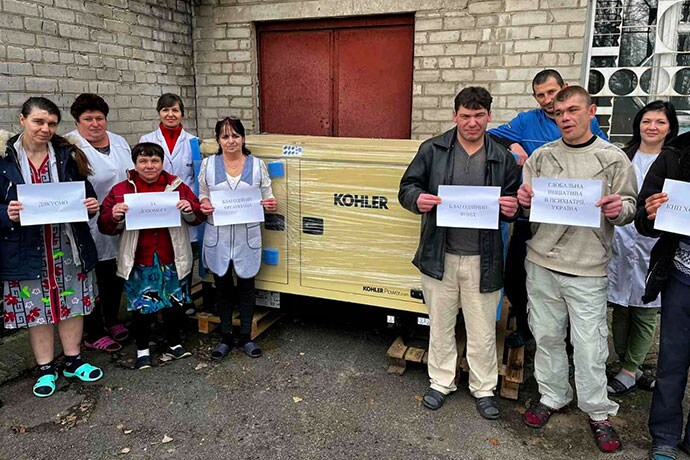As the Russian invasion of Ukraine staggers on, it is the devastation and loss that makes headlines — the killing and wounding of Ukrainian soldiers and civilians, the constant explosions, and the charred remains of buildings and homes. But what media images can’t show is the psychological devastation, the war’s invisible wounds.

Robert van Voren, PhD
To help ease Ukrainians’ psychological pain and suffering, an international nonprofit mental health rights organization has stepped up to provide medical supplies and mental health services to Ukrainians as they struggle to survive.
The psychological trauma and ensuing mental illness caused by the war can be profoundly damaging, noted Robert van Voren, PhD, chief executive of human rights in mental health for the Human Rights in Mental Health–Federation Global Initiative on Psychiatry (FGIP).
“The war, which started 9 years ago, reached a totally new level with the [Russian] invasion in February last year, and the result we all know — more than 10 million refugees, tens of thousands of deaths, destruction and pillaging, rape and torture, and a psychological crisis of incredible magnitude,” van Voren told Medscape Medical News.
For the past year, with the help of donations, FGIP has provided life-sustaining support to Ukrainians.
For the first few months after the invasion, van Voren said, FGIP purchased a couple of vans and trailers to deliver humanitarian aid to social care homes and hospitals, including those on the front lines. “The trailers were also used to help civilians flee from the Eastern front line,” he said.
Life-Saving Supplies
Aid came in the form of food and medical and sanitary supplies. There has been a massive shortage of medications, van Voren noted, especially psychotropics, which are notoriously difficult to get through customs.
Winter in Ukraine can last anywhere from November or December until March, with average temperatures ranging from -4.8 °C to 2 °C (23 °F to 35 °F,) but temperatures can quickly dip down to -20 °C (-4 °F) or lower.

Workers at the Kharkiv Psychiatric Hospital hold signs of gratitude after receiving a 32-kW generator to help keep the facility running.
When, in early winter of 2022, Russian forces bombed Ukraine’s energy grids in order to cut power to much of the country, FGIP raised enough money to purchase almost two dozen generators to keep hospitals and other care facilities functioning.
The sizes of the electrical generators range from 11 kW to 220 kW, the latter of which can cost upward of €36,000, including transportation and installation.
To the ensure safe delivery of the supplies, FGIP works with the Armed Forces of Ukraine so that they have military protection in the most dangerous places, van Voren said.
The organization has also purchased and delivered blankets for patients and more than 800 headlamps to permit staff to make rounds during blackouts.
van Voren coordinates most of the efforts from his home base in Lithuania and makes the 24-hour journey into Kyiv once a month to facilitate the delivery of medical aid.
Online Mental Health Program
As soon as Russia invaded Ukraine, FGIP sprung to action with a psychological first-aid program, said van Voren.
“When the invasion began, there was, in a fairly short amount of time, an enormous wave of refugees either leaving the country or internally displaced,” he noted.
Knowing that there was no way to provide mental health services everyone who required them, FGIP collaborated with the National Institute of Mental Health in Prague, Czech Republic, and GIP-Tbilisi to develop an online program called Samopomich, which is Ukrainian for self-help.
Since its launch, the website has garnered more than 300,000 active users. There is also a Facebook page with some 60 million views to date.
van Voren said that the idea behind the self-help program is that “people can do a lot to help themselves to prevent serious mental health problems by taking care of themselves if they have the tools and the ideas.” The website provides evidence-based materials on how to handle feelings of depression, panic, or other specific situations and when to seek help.
There is also a group of mental health professionals that treat people experiencing emergencies, much of which are trauma-related. In addition, there is a component that offers online consultations with trauma experts to first-line responders, such as those working in rescue services, mental health professionals, and journalists.
Much of the coordination of clients with therapists has been taking place below ground in the Kyiv metro system, van Voren said, where there is a steady internet signal.
van Voren said that he has also been working in the area of prison mental health reform. Specifically, he is leading an effort to establish a specialized mental health unit in the Drohobych prison, south of the Ukrainian city of Lviv. The team will specialize in treating war veterans entering the prison because of crimes committed due to trauma sustained through battle.
However, until the unit opens and the training is deployed, the prison has been overflowing with evacuees from other prisons on the frontlines, causing chaos within the penitentiary, said van Voren.
The project involves reconstruction, training of prison staff and judges, and the development of new protocols for treating prisoners, he noted.
“As it happens in other countries, prison administration doesn’t acknowledge the extent of the problem of mental illness in the inmate population,” van Voren said, adding that when prison staff lacks training to deal with mental illness in prisoners, there is an increased risk for violence among inmates.
US Psychiatrists Step Up
van Voren depends on the support of others to fund and coordinate the purchase and delivery of medical supplies for hospitals in Ukraine. That’s where psychiatrists Carmen Andreescu, MD, and Alex Dombrovski, MD, entered the scene.
The two began volunteering with FGIP more than 1 year ago, raising thousands of dollars for FGIP from Pittsburgh. Both psychiatrists have personal connections to Ukraine; Andreescu, who is associate professor of psychiatry at the University of Pittsburgh, grew up and attended medical school in Romania.
She told Medscape Medical News that she understands the experience of the oppressive Soviet reign through her life and heritage.
Alex Dombrovski, MD, associate professor of psychiatry and Pittsburgh Foundation Endowed Professor in Mind and Brain Research in the School of Medicine, is originally from Moscow and said that his conscience prompted him to act.
“I feel ashamed of what Russia is doing, and it makes me think about what my responsibility may be,” he told Medscape Medical News.
The FGIP was active long before the war; political activists united in 1980 as the International Association on the Political Use of Psychiatry (IAPUP) to end the incarceration of political dissidents in psychiatric hospitals, Andreescu noted.
For most of the 1980s, the organization fought political abuse of psychiatry in the Soviet Union, Romania, and several other countries.
Starting in 1989, IAPUP began developing humane, ethical, and user-oriented mental health services in Central and Eastern Europe and in the former USSR. Before that, “psychiatry was used as a way to control political dissidents,” she said.
She explained that in the former Soviet Union and other Eastern bloc countries, government officials silenced political opponents with “false diagnoses such as schizophrenia, and often gave them large doses of psychotropic medications.”
If the dissident spoke out about being persecuted by the state, Andreescu said, these accusations were dismissed as delusions stemming from psychosis, and the “patient” was silenced with high doses of chlorpromazine or similar drugs.
“The severe consequences of this war not only impact this generation, but future generations,” Andreescu said. “We have a duty to act.”
Donations to the FGIP can be made here.
For more Medscape Psychiatry news, join us on Twitter and Facebook
Follow Medscape on Facebook, Twitter, Instagram, and YouTube
Source: Read Full Article